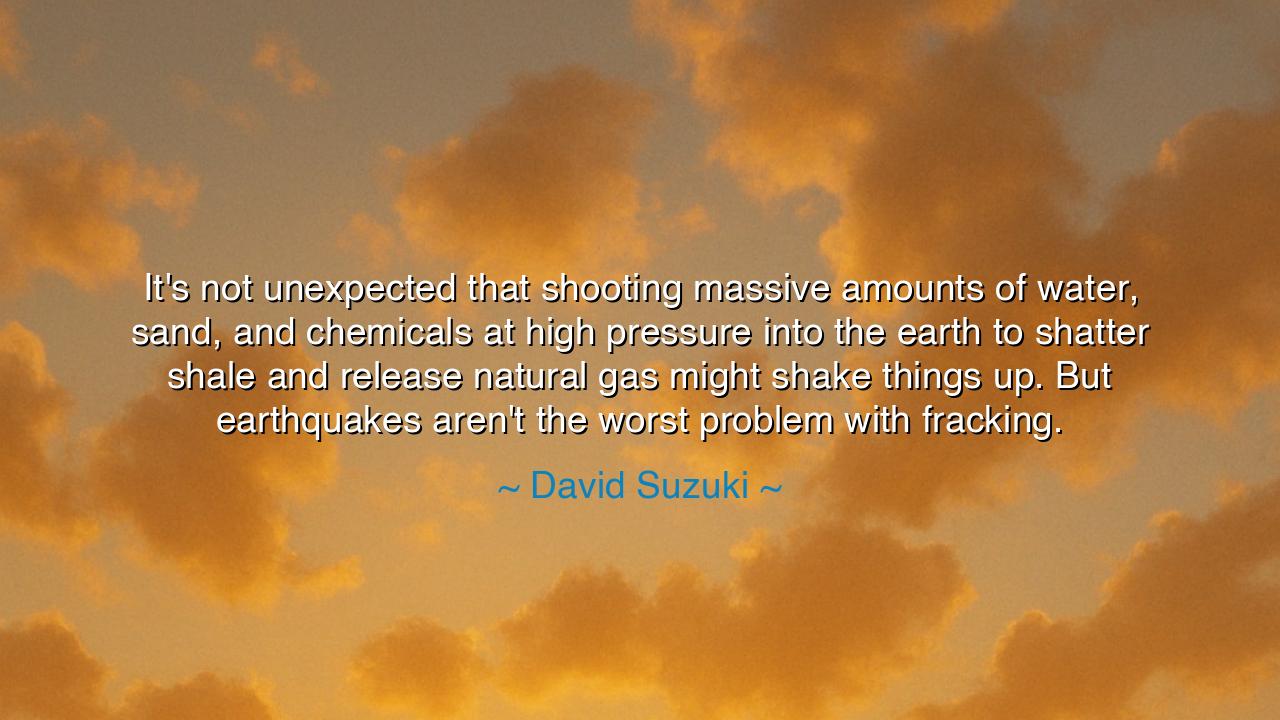
It's not unexpected that shooting massive amounts of water, sand
It's not unexpected that shooting massive amounts of water, sand, and chemicals at high pressure into the earth to shatter shale and release natural gas might shake things up. But earthquakes aren't the worst problem with fracking.






In the voice of a careful sentinel, David Suzuki speaks: “It’s not unexpected that shooting massive amounts of water, sand, and chemicals at high pressure into the earth to shatter shale and release natural gas might shake things up. But earthquakes aren’t the worst problem with fracking.” Hear how this saying walks with two staffs—plain craft and stern warning. First, it grants the obvious: when we shatter stone, the earth may answer with tremor. Second, it points past the spectacle of seismicity toward quieter harms that linger after headlines fade: the fates of air, water, and health, and the long arithmetic of waste.
The ancients counseled that wisdom begins by naming the thing as it is. Fracking—a mingling of force and fluid—bores down with high pressure, fractures rock, and calls forth fuel from seams that would not yield to gentler hands. To expect calm beneath such stress would be naïve; the heart of Suzuki’s proverb is simply this: the obvious shock is not the final danger. We are dazzled by earthquakes because they shout. But many perils whisper: methane slipping from valves; volatile compounds ghosting into air; flowback bearing salts and metals toward mismanaged pits; the slow seep of trust from communities asked to drink and breathe without doubt.
Consider a lamp from recent years. In more than one region, clusters of quakes arrived not so much from the fractures themselves as from wastewater injection into deep formations—human rhythms imposed on geologic patience. Towns felt their plates and cups quiver; steeples ticked in their mortar. Authorities adjusted practices, throttled volumes, shifted sites, and the ground learned a softer cadence. The lesson: engineering choices can amplify or temper the earth’s reply; vigilance is not an ornament to industry but its metronome.
Yet Suzuki bids us look further. A cracked cup can be mended; a fouled aquifer is a generational wound. The gravest questions concern the journey of fluids before, during, and after the fracture: the guarding of well integrity; the handling of returned waters; the shielding of streams from spills and dust; the counting of every ton of methane that slips skyward to thicken the planet’s fever. The worst harms are not always sudden—they are cumulative, braided into seasons and lungs, into the ledger of climate and the hush of a meadow where birds no longer gather.
Another lamp: a household where the tap grew suspect. Whether the blame lay in shallow gas, bad casing, surface spill, or none of these, the consequence was the same—trust drained faster than any tank. Trucks rumbled; flares winked; neighbors argued across fence lines. In time, investigations brought partial answers, remedial orders, sometimes new pipes. But what took longest to restore was the simple act of pouring a glass without listening for rumor. Here, the proverb’s point hardens: earthquakes subside; fractured trust endures.
The origin of Suzuki’s oracle is the naturalist’s habit of whole-systems sight: rocks and watersheds, chemistry and lungs, rigs and roads, all bound in a single tapestry. He does not deny the power of technology; he asks whether our governance and humility match that power. For the earth keeps books in units we often ignore: baselines measured before drilling, leak rates verified in daylight, waste accounted for without euphemism, emissions priced by the harm they sow.
What, then, is the teaching for our hands and our halls? First, do not be hypnotized by the loud risk and blind to the quiet one. Demand baseline testing of water and air; publish results where neighbors can read them. Tie permits to well integrity proven, not promised; require closed-loop wastewater handling; track methane with instruments, not estimates. Let violations cost more than shortcuts save; let excellence be rewarded in contracts and credit. And pair all this with the slower courage of transition: efficiency first, then renewables, then storage and smarter grids—so that the appetite that drives fracking declines by design, not by disaster.
Finally, carry this lesson like a smooth stone in your pocket: prudence is love with a long memory. If you live in shale country, learn your watershed, know your ordinances, join the citizen monitors who keep the clocks honest. If you lead, set standards that can learn—pilot, measure, revise. If you invest, favor firms that count every molecule and return every gallon with honor. For the earth will forgive much when we admit what we do, repair what we harm, and aim our cleverness at using less. Earthquakes make news; the quiet choices we make about water, air, and waste will make the future.






AAdministratorAdministrator
Welcome, honored guests. Please leave a comment, we will respond soon